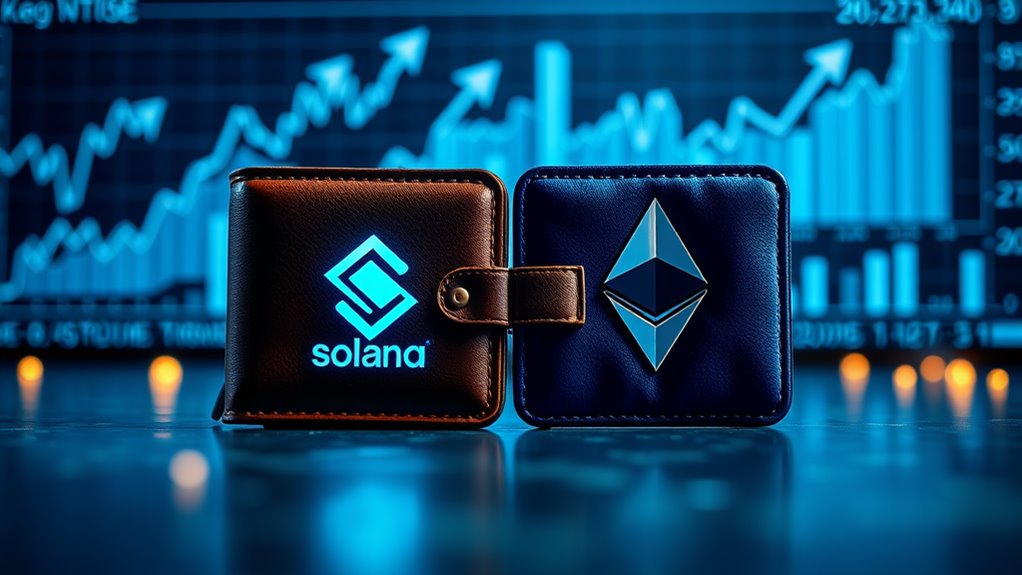In terms of blockchain technology, Solana and Ethereum are like two heavyweight contenders in a ring, each with their own unique strengths. You might wonder why they’re often compared. Well, it’s all about speed, cost, and community support. Both platforms are pushing the limits of what’s possible, but they do it in very different ways. Curious about how they stack up against each other? Let’s break it down!
Transaction Speed
With regard to transaction speed, Solana and Ethereum really show their differences.
Solana boasts impressive transaction throughput, handling thousands of transactions per second. This makes it lightning-fast compared to Ethereum, which, let’s be honest, can feel like waiting for a slow train.
When you look at the latency comparison, Solana’s network really shines. You’ll notice it executes transactions in just a few seconds, while Ethereum can take much longer, especially during peak times.
If you’re looking for speed, Solana’s your go-to. It’s like comparing a speedy sports car to a classic but slower ride.
Scalability
Regarding scalability, Solana and Ethereum take very different approaches. Solana boasts a larger block size, allowing it to process thousands of transactions per second. This means less network congestion, making it a go-to for high-demand applications. On the other hand, Ethereum, while incredibly popular, often faces challenges with scalability. Its smaller block size can lead to slower transactions during peak times.
Here’s a quick comparison:
| Feature | Solana | Ethereum |
|---|---|---|
| Block Size | Larger (Up to 2 MB) | Smaller (Around 30 KB) |
| Transactions/sec | 65,000+ | 30+ |
| Network Congestion | Minimal | Common |
Cost of Transactions

Regarding transaction costs, the difference between Solana and Ethereum is like night and day.
When you make a transaction on Solana, you’re usually looking at fees that are mere fractions of a cent. Yeah, you heard that right!
On the flip side, Ethereum’s transaction fees can skyrocket, especially during network congestion. Those fees can hit your wallet hard, especially when demand is high. Imagine wanting to send a few bucks and suddenly facing a hefty price tag instead!
With Solana, you can feel free to transact without breaking the bank. So, if you’re watching your spending, Solana’s low fees might just make it your best buddy in the blockchain world.
Happy transacting!
Consensus Mechanism
When you immerse yourself in the world of blockchain, the consensus mechanism is like the heartbeat of the network. It determines how transactions are validated and added to the blockchain. Ethereum uses Proof of Stake (PoS), allowing validators to create new blocks based on the amount they hold. On the flip side, Solana employs a Delegated Proof of Stake (DPoS) system, where users nominate validators to secure the network.
Here’s a quick comparison:
| Consensus Mechanism | Blockchain |
|---|---|
| Proof of Stake | Ethereum |
| Delegated Proof | Solana |
| Speed | Solana is faster! |
Both approaches have their strengths. Understanding these differences helps you appreciate how each blockchain operates. Engage and investigate!
Developer Ecosystem

After exploring how Ethereum and Solana validate transactions, let’s turn our attention to the developer ecosystem.
Both blockchains offer unique developer tools, but they cater to different needs. Ethereum has a long-standing community, rich resources, and extensive documentation. You’ll find plenty of forums buzzing with activity, making it easy to engage and collaborate.
On the flip side, Solana’s ecosystem is growing fast. While it’s newer, it’s attracting developers with its speed and lower costs. Its community engagement is vibrant, with hackathons and events popping up regularly.
Smart Contract Functionality
Smart contracts are like the magic spells of the blockchain world, automating processes and executing agreements without the need for middlemen. You might wonder how Solana and Ethereum stack up in this aspect. Here’s the scoop:
Smart contracts are the blockchain’s magic spells, streamlining processes and executing agreements without intermediaries.
- Smart Contract Languages: Ethereum uses Solidity, while Solana employs Rust and C. Each has its perks!
- Execution Speed: Solana’s smart contracts execute faster, thanks to its unique architecture.
- Smart Contract Security: Both networks prioritize security, but Ethereum has a more established track record.
In this battle of smart contracts, each blockchain brings something unique to the table. Whether you’re after speed or security, you’ve got options. It’s all about finding what fits your needs best!
Community Support

Community support plays a crucial role in the success of any blockchain, and both Solana and Ethereum have passionate followers. You’ll find lively discussions, workshops, and meetups happening in both camps. Each community thrives on engagement, sharing ideas and fostering user sentiment.
Here’s a quick look at how they stack up:
| Feature | Solana | Ethereum |
|---|---|---|
| Community Size | Rapidly growing | Well-established |
| Engagement Events | Frequent hackathons | Regular conferences |
| Social Media Presence | Strong on Twitter | Diverse across platforms |
| User Support | Quick response times | Extensive documentation |
| Developer Involvement | Highly active | Deep-rooted developer base |
Both ecosystems encourage innovation! So, whether you vibe with Solana or Ethereum, the community’s energy is sure to inspire you.
Use Cases and Adoption
With regard to real-world applications, both Solana and Ethereum have made significant strides in use cases and adoption. They’re leading the charge in numerous fields, and it’s fascinating to see how they’re being accepted.
Here’s what you should know:
- Decentralized applications: Both platforms support a vibrant ecosystem of dApps that cater to a variety of needs.
- Enterprise solutions: Companies are exploring how blockchain can streamline processes, thanks to both networks.
- NFT marketplaces: Creators and collectors flock to Solana and Ethereum to buy, sell, and trade digital art and collectibles.
On top of that, both are making waves in financial services, revolutionizing how we think about transactions.
The future’s bright, and it’s exciting to see where they’ll go next!
Conclusion
In the clash of Solana vs. Ethereum, both have their strengths! Did you know Solana can handle over 65,000 transactions per second? That’s like a lightning-fast rollercoaster ride compared to Ethereum’s 30+. Whether you’re drawn to Solana’s speed or Ethereum’s established community, there’s a fit for everyone. As both ecosystems grow, your choice might just come down to what excites you the most. Immerse yourself and discover the future of blockchain!